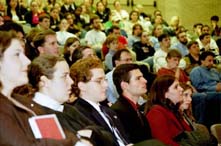Scheherezade Daftary recalled a time before the legalization of abortion.
“Before Roe v. Wade, it was poor and young women who had to refer to back-alley abortions,” she said.
Cathleen A. Cleaver had a different outlook.
“Unlimited abortion in this country has been a 30-year social experiment on women,” she said.
January 22 marked the 30th anniversary of the 1973 Roe v. Wade decision that legalized abortion.
On Feb. 6, Daftary and Cleaver participated in a public forum entitled “Thirty Years Since Roe v. Wade: What will our Generation Choose?” in Nunemaker Auditorium.
They had two hours to argue, retort and defend their positions.
“We realize this is an emotionally charged topic,” said Ryan Richardson, economics senior who introduced the speakers.
The organizations sponsoring the event were the Association of Women Law Students, the University Programming Board, Residential Life, the Women’s Resource Center, Compass, the Student Government Association, the Jesuit Center, the Women’s Issues Organization, Loyola Life, and University Ministry.
Each speaker had 20 minutes. This was followed by a 10-minute rebuttal and a student panel response.
“I was scared. The crowd looked frightening, but then they laughed, and that’s how I knew no one was going to get torn to shreds,” said Aaron Walker, communications freshman, who moderated the forum. Still, police were present all evening.
Scheherezade Daftary, resident of the Louisiana National Organization for Women and the Vice President of Public Relations for the Greater New Orleans Chapter of NOW, addressed the audience first.
“Roe v. Wade — many of us take it for granted. It’s all we’ve known,” Daftary said.
She related accounts by women who took part in pre-Roe v. Wade abortions and discussed the privacy issue inherent in the Supreme Court decision.
“Women had had enough and wanted to have control over their own bodies,” she said.
Her lecture hit on other points, including the issue of partial-birth abortion and what she called the need to provide more contraceptives.
“The only way to decrease the number of abortions is to provide contraceptives,” Daftary said.
She said preaching abstinence is not effective in preventing pregnancy in young people.
“We need to stop pushing only abstinence in schools, but include it among other contraceptive programs,” Daftary said.
“In order for abstinence to work for a woman who wants only two children in her life, she will have to abstain for 20 years of her life,” she said.
Daftary called on the audience members to make their own decisions on the issue.
“There are a lot of gray areas in this issue. Nothing is black and white,” she said as she handed over the podium to her opponent.
Cathleen A. Cleaver is the Director of Planning and Information Secretariat for Pro-Life Activities, of the United States Conference of Catholic Bishops.
“Today, there is not one abortion that can be stopped by law,” Cleaver said.
She discussed the Roe v. Wade case, back-alley abortions and the accountability of rape in abortion rates.
“Abortions for rape account for only one percent of abortions every year,” she said. “Abortion does not erase the pain of rape.”
She said divorce and child-abuse rates have increased since the decision.
“Today, there is more illegitimacy than ever,” Cleaver said.
She also said that abortion is now used as a form of birth control, but Daftary took issue with that.
“The idea that abortion is birth control is not economically viable. Most people in this room could not afford it,” Daftary said.
She argued that rape and incest justify abortions.
“Would anybody walk up to a girl impregnated by her father and tell her she did not have a choice?” Daftary said.
Cleaver rebutted that abortion becomes the only choice in many instances.
“Employers still discriminate on the issue of pregnancy,” Cleaver said.
“No compassionate person should push a woman to go through the pain of abortion,”she added.
Some audience members, although they were admonished not to clap, broke into spontaneous applause after each of the speakers finished.
A panel of four Loyola students, two men and two women, responded to the speaker’s arguments. They fielded questions from the audience on a large spectrum of issues, from democracy to cloning.
The audience occasionally got emotional and moderator Walker had to restore order.
“If this question and answer period gets out of hand, it will be ended,” he said, then reiterated the parameters of the forum.
“I think tonight’s event was an extremely positive experience for an issue of this controversial nature. I am delighted and hope this is the beginning of many events just like this one,” Christian Brugger, assistant professor of religious studies, said.
The event elicited audience reactions as divided as the speakers’ opinions.
“I felt like it was very pro-life,” Christie Carew, music business major, said. “Most of the audience was pro-life, the moderator was pro-life. The whole thing was very one-sided.”
“I agree with a lot of the points from both speakers in that the facts need to come out. We need to know what the truth is, one way or the other,” said Lisa LaFleur, music education senior and one of the founders of the Loyola Life and Compass organizations.
“As a whole, it was a good turnout. I would have liked to see more pro-choice people in the audience,” Barbara Webster, sociology senior, said.

Scheherezade Daftary (front), president of the Louisiana National Organization for Women, looks out on the audience as Cathleen A. Cleaver, the director of planning for Pro-Life activities for conference of Catholic bishops, speaks.






